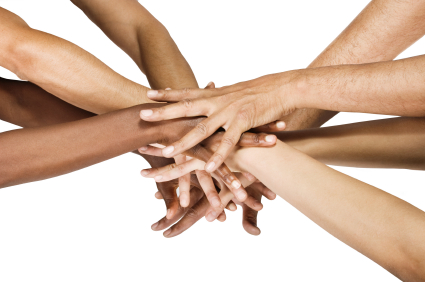When authorities were searching for suspects after the Boston Bombings, I was really hoping that they wouldn't turn out to be Muslims. As an Indian-American Hindu, in the years since 9/11 I have been repeatedly racially profiled and questioned while travelling. Now that the suspects have been identified as Muslims, I am concerned that we may see similar and increased xenophobic reactions against Muslims as a whole.
In times like these, it is more important than ever for Americans from all possible hyphenations to understand each other better by building new relationships. We need cross-cultural exchanges among ethnic, religious, and socioeconomic groups that normally don't mix. Here are three reasons why:
1. Isolation of people from different backgrounds leads to misunderstandings, which can cause tension and conflict.
Although America is in many ways a melting pot, the analogy of the salad bowl is still more accurate in most cases. In the salad bowl, the different pieces are all in one place, but they remain separate. I think the separation is dangerous because it can give rise to stereotyping and negative assumptions. These assumptions can build into hatred, and from hatred we may see violence.
In 2009, Tamerlan Tsarnaev was quoted in a photo essay as saying, "I don't have a single American friend, I don't understand them." This is an example of how different groups in our society are often separated despite living in close proximity. We need to be engaging people from diverse identities, especially youth, in conversations with each other about issues that matter to them. Discussions like these are already being facilitated by a number of organizations.
In fact, earlier this month, I attended a conference called the Emerging Economies Jam, which was arranged by a non-profit called Yes World. The event brought together 30 people from diverse backgrounds to discuss the future of the economy. Meeting the other participants was more valuable for me than the discussions themselves. I made new friends and relationships with people from ethnic and socioeconomic backgrounds whose paths I normally don't cross. One new friend was a middle-aged white male who came from a privileged background. After the conference, he invited me and a young African-American female to go sailing with him on his boat. Interacting with individuals from those communities helped me to better understand their communities as a whole, and shattered many assumptions and stereotypes I had subconsciously been making.
2. Cross-cultural relationships help to keep us from associating extremist viewpoints with whole communities.
Earlier this week, Eboo Patel wrote an enlightening piece on this point. Patel cited a study that took place during the mid-2000s when the Catholic pedophilia crisis was happening. Despite the negative press, the study showed that Catholics were still among the most favorably viewed religious communities in America.
The reason why Americans were not associating all Catholics with the actions of the pedophiles was that most Americans had positive relationships with other Catholics. They associated the broader Catholic community with their friends, neighbors, and colleagues, instead of the pedophiles. This insight is particularly relevant right now when the Muslim identity of the Boston Bombers has cast suspicion on the Muslim community as a whole.
Building a genuine relationship with someone from a different ethnic, religious, or socioeconomic community can improve our conception of that community as a whole. Relationships like these make it less likely that we will make blanket associations with small extremist elements and the larger communities that they come from.
3. Kindness and acceptance are the only things that can ever fully disarm extremists.
It is my firm belief that every act of force, violence, exclusion, and profiling does nothing but foster more extremism, radicalization, and potential terrorism.
Injustices such as those being carried out in Guantanamo and in the multiple Middle Eastern Wars that the U.S. has created are going to breed a fresh generation of extremism. And here at home, negative attitudes and actions towards Muslims will create more potential Tsarnaevs.
I really feel that people like the Tsarnaevs could only have been stopped through more positive, kind, and accepting relationships with other fellow Americans from different backgrounds.
Now more than ever is the time for Americans to do something radical and extreme: make new relationships with others from different backgrounds. Such simple acts as these will have lasting reverberations that will help to heal this country.

Follow Rohit Kumar on Facebook.
?
"; var coords = [-5, -72]; // display fb-bubble FloatingPrompt.embed(this, html, undefined, 'top', {fp_intersects:1, timeout_remove:2000,ignore_arrow: true, width:236, add_xy:coords, class_name: 'clear-overlay'}); });
Source: http://www.huffingtonpost.com/rohit-kumar/after-boston-bombings-3-r_b_3156740.html
Sequester Miami Heat Harlem Shake Harlem Shake Miami Heat stephen curry dr seuss mariah carey History Channel The Bible
কোন মন্তব্য নেই:
একটি মন্তব্য পোস্ট করুন